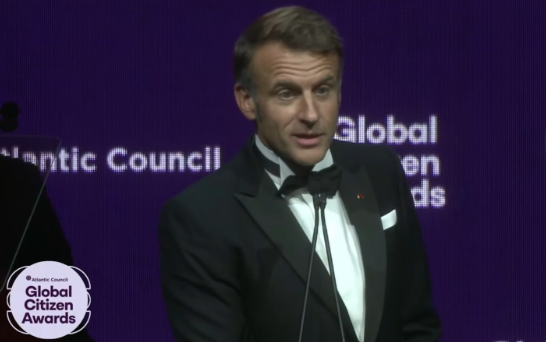
BY MARYANA AVERYANOVA
The Atlantic Council hosted its annual Global Citizen Awards on Wednesday evening, honoring international leaders for their contributions to global cooperation. Argentine President Javier Milei and French President Emmanuel Macron were among the honorees. They addressed geopolitical and domestic challenges during the event, which was streamed live.
The Atlantic Council was founded in 1961 to strengthen cooperation between North America and Europe, now focused on global security, diplomacy, climate, economics, and technology. It is known for annually hosting Global Citizen Awards and Distinguished Leadership Awards. Global Citizen Awards are often presented during United Nations General Assembly week in New York. While there is no open public nomination process or exact criteria; honorees are chosen internally by the Council’s leadership and advisors. All we know is that nominees are typically recognized for their significant impact on diplomacy, peace, or innovation and technology. This year two presidents were recognized.
Both France and Argentina are experiencing political, economic, and social unrest. In France, a Paris court sentenced former President Nicolas Sarkozy to five years in prison for criminal conspiracy; at the same time, major French unions called for more protests to oppose the government’s austerity measures and budget cuts. Similar unrest happened on the other continent. According to the Associated Press, in Argentina Javier Milei’s popularity fell. His party suffered a significant defeat in the Buenos Aires provincial election. On top of that, economically, the peso is weakening. These and other pressures have been affecting the national atmosphere and mood in both countries.
But Atlantic Council Chairman John F.W. Rogers explained, the point of the evening was to recognize and honor three global leaders “who have taken up the call to serve a purpose greater than oneself.”
Milei accepted his award with a speech centered on Argentina’s economic crisis and his administration’s sweeping reforms. He described taking office in December 2023 as inheriting a nation in “critical condition,” on the brink of collapse from decades of mismanagement, hyperinflation, and debts. “From the very first moment it was clear to us that we needed to take drastic measures to avoid falling over the cliff,” Milei said.
Argentina has achieved a fiscal surplus for the first time in 123 years without defaulting on its debt, making it one of only five countries worldwide to do so. His government has lifted currency controls and begun the slow process of normalizing the economy. “We know this has been a difficult time for the Argentine people,” Milei said, “Like in every process to clean up public accounts, we have to take measures that may seem unpleasant, but which are fundamental to put the country back on the path of growth.”
Ahead of Argentina’s legislative elections, Milei warned that former regime allies are trying to derail his agenda and praised Donald Trump as a great inspiration. “We will not stop fighting for the ideas of freedom with unwavering conviction and the goal of making Argentina great again,” said Milei, concluding his speech.
While Milei’s speech focused on a single nation’s struggle for renewal, Macron’s message turned outward, offering a sweeping call for global unity at a moment of overlapping crises. Speaking without a prepared script, he reflected on what it means to be a “global citizen.”
“You can love your country and love to cooperate with others,” he said, distinguishing patriotism from nationalism.
He urged his audience to recommit to the post–World War II principles of peace, prosperity, and democracy, warning that all three are under threat. He condemned Russia’s war in Ukraine, calling it a threat to international law. “Our duty as free nations is clearly to back the Ukrainians. Not just to resist but to recover their territory and their integrity,” he said. Then, turning to the Middle East, he expressed the need for consistency in defending human rights, calling for the release of hostages taken during the October 7 Hamas attacks, an immediate ceasefire in Gaza, and a two-state solution. “No double standard,” Macron said, noting that the U.N. backed this principle nearly eight decades ago. “What is at stake is human life.”
On prosperity, he warned that global economic cooperation is vital to address debt, inequality, and climate change. “There is no planet B,” he said. “We need more growth, more innovation, and fixing climate change through decarbonization of our economies.”
Macron continued with a warning about threats to democracy, one of which is unregulated social media.“Our democracies were not conceived with social media, and we were definitely too naive,” he said. “It was made on purpose to create excitement, engagement and guess what, money. I don’t want my democracy to be driven by an algorithm whose unique purpose is to create this excitement and to spread crazy contents because it’s just killing the possibility of a common discussion.”
Macron ended his speech by mentioning the importance of unity between Europe and the United States, he said, “We have to work together” to protect peace, prosperity, and democracy.
